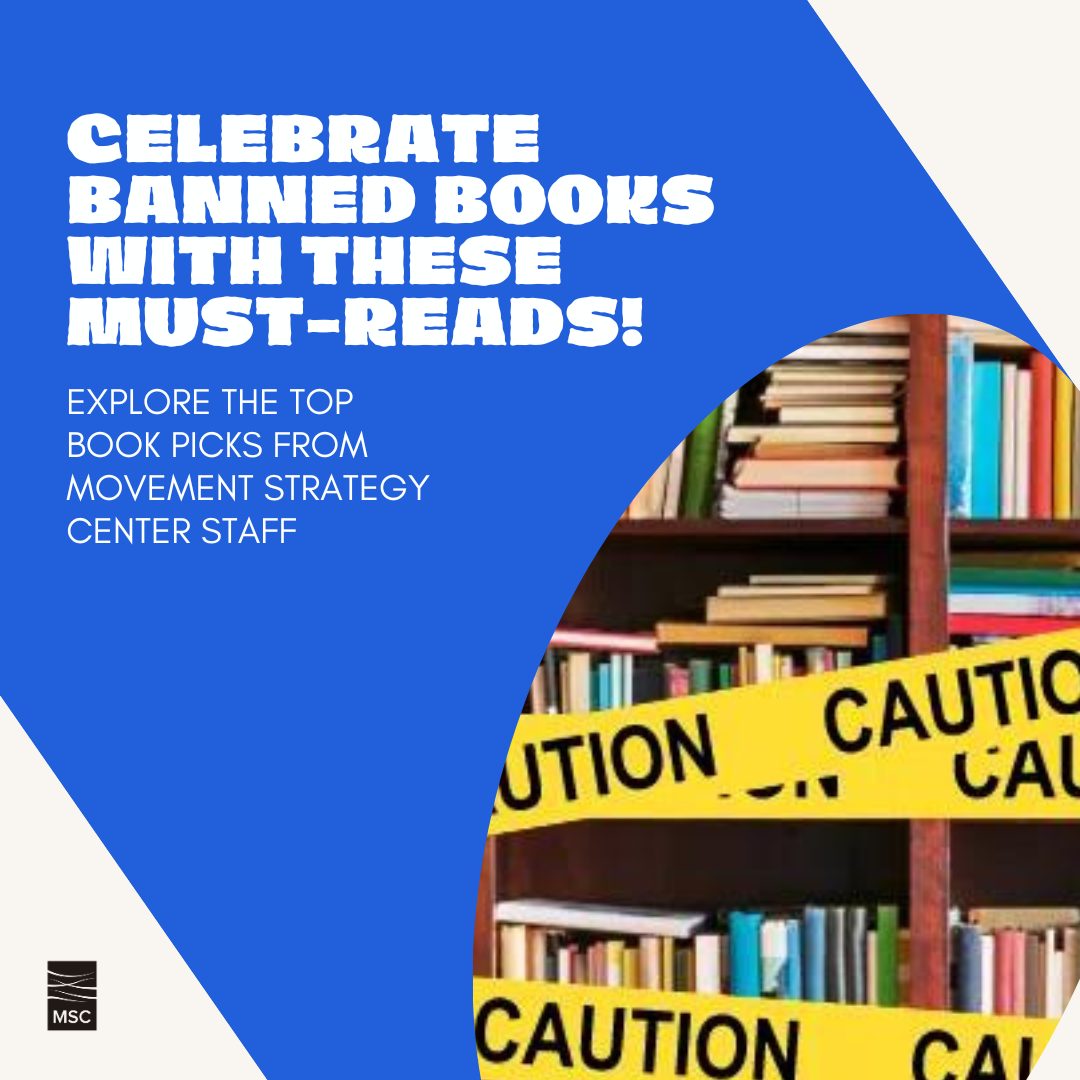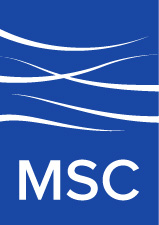Movement Strategy Center Dives into Consciousness-Raising Reads

As the political climate around libraries and books becomes more contentious — a school district in North Florida banned nearly 2,000 books, including the dictionary — it’s crucial to remember the importance of diverse and impactful literature. Last year, during Banned Book Week, Read a Book Day, and International Literacy Day, Movement Strategy Center’s core staff highlighted books that faced censorship and offered thought-sparking perspectives across our various social media channels. As this trend of censorship continues, we’re resharing these powerful reads.
Here’s a glimpse into the diverse and thought provoking selections from our staff:

David Malinowski, our Advancement Coordinator, selected books that shed light on the intersection of racial justice and health equity. The riveting the Immortal Life of Henrietta Lacks is bigger than the story of Lacks’ cells revolutionizing modern medicine. It’s a story of struggle and demand for acknowledgment against institutions like John Hopkins University and a reminder that while we laud scientific advancements, we must never forget the individuals who make discoveries possible. He also recommended Pageboy by Elliot Page, an honest, unapologetic memoir from childhood to adulthood and his journey as a trans man. Page’s story helped him better understand what it means to be transgender and the consequences of a society built to delegitimize a person’s very existence from childhood and is a testament to the power of love and acceptance.
Daniel Parada, Director of Fiscal Sponsorship, champions So You Want to Talk About Race? by Ijeoma Oluo, a must read for anyone eager to understand and engage in meaningful dialogues on race. Oluo offers insights on apologizing, fostering meaningful dialogues, and urging societal introspection; the book supports readers in deepening their understanding and sparking compassionate conversations on race.

Similarly, How To Be An Antiracist by Ibram X. Kendi, educates and inspires people to accept, embrace, and celebrate differences. Our Chief Advancement Officer, Mohini Tadikonda, feels it should be a required curriculum for children and adults. Kendi uses relatable stories and references, explicitly drawing attention to conscious and unconscious bias and explicit racism towards Black people in America, and offers solutions for positive change. “Why anyone would find this book divisive or dangerous is beyond comprehension. It’s a guide to being a better person,” Tadikonda says. “I’ve used this book as an effective tool in DEI workplace training and encourage everyone to keep a copy handy and share this powerful manual with others.”
Tadikonda also recommended the Narrative of the Life of Frederick Douglass by Frederick Douglass. The author’s powerful, inspiring, and rare 75-page autobiography should be mandatory reading for all humans. We know of the savagery of slavery as told by scholars, historians, and storytellers, but to have a first hand account written by a formerly enslaved person, in his own words, and with his own hands, is a precious gift. Despite the extreme brutality and hopelessness of his situation, he found a way to teach himself to read and write, free himself, become a scholar and abolitionist, and publish his incredible story. It is the ideal book to pick whenever we need a reminder of what it means to truly struggle, overcome adversity, and live a purposeful life.

Project Advisor Karmella Green suggests Abolish the Family: A Manifesto for Care and Liberation by Sophie Lewis, a provocative examination of family structures and care in a capitalist world. Lewis asks how we view family in a world conditioned by capitalism and challenges us to reimagine what family and care look like for each of us collectively. Though small, it’s packed with sharp and engaging revelations.
M Archive: After the End of the World, by Alexis Pauline Gumbs, is another of Green’s favorites. Gumbs, a trusted name within our ecosystem, challenges readers to contemplate: “how many breaths did you enjoy?” Green describes it as an enthralling and nuanced exploration of revolutionary love, asking, “in pursuit of revolutionary love, what does love mean beyond your own survival?”

Do you remember Christian Cooper? Frank Gargione’s pick, Better Living Through Birding by Cooper, provides a unique perspective on birding, identity, and nature. Released in 2023, the book is as much a tribute to birds and birding as it is a travelog, a spiritual journey, and a reflection on growing up Black, queer, and nerdy.
Gargione, MSC’s Communications Director, also suggests Demon Copperhead by Barbara Kingsolver. This powerful narrative — a 2022 Pulitzer winner and Oprah pick — is set in Appalachia and is a contemporary retelling of Charles Dickens’ David Copperfield. Another favorite of his is Harlem Shuffle by Colson Whitehead, which captures the essence of 1960s New York City — centering on the riots, the culture, race, class, and the often told tale of Manhattan strivers striving to be bigger and better in any way they know how.

Our Communications Manager, Lidia Alvarez, shared her appreciation for ancestor Octavia Butler’s work. Kindred mixes sci-fi with raw, historical truths, giving a deep look into America’s brutal history of slavery. It tackles the past to shape our future through its unflinching examination of slavery and racial discrimination. “The ease. Us, the children … I never realized how easily people could be trained to accept slavery.” For Alvarez, Kindred isn’t just a story but a stark reminder that understanding our past is crucial in shaping a more equitable tomorrow.
Andrea Granda, MSC’s Chief Strategy & Innovation Officer, is also a Butler fan. She recommends Parable of the Sower, a sci-fi story that unfolds through the diary entries of Lauren Olamina, a Black teenager, in 2024. Butler delves deep into humanity’s resilience amidst global climate change and the profound upheavals of capitalism. Granda joins other team members who have visited EARTHseed Farm in Sonoma County — a Black-owned regenerative haven. The farm is tangibly inspired by Butler’s visionary world, and serves as a poignant reminder of the novel’s relevance.

As shared by project advisor Alejandra Lezma, Homo Irrealis by Andre Aciman, is a book that reflects a state of mind we often have as humans. The “irrealis” is a limbo between fantasy and reality, the longing for what could’ve been, didn’t, but could still be. Lezma was drawn to it because the author bases this feeling on his immigration journey, looking at the life that wasn’t and the conflict around that — Lezma’s perpetual state of mind.
These books, along with others like Good Talk by Mira Jacob, Listening to Stone: The Art and Life of Isamu Noguchi by Hayden Herrer, and Breaking Out In Prison by Babita Patel, offer insights into diverse experiences and perspectives. They remind us that understanding our past and embracing different viewpoints is crucial in shaping a more equitable future.
The list of recommendations is long. Other honorable mentions include Empire of Pain: The Secret History of the Sackler Dynasty by Patrick Radden Keefe, the Vanishing Half by Brit Bennett, and the Sixth Man by Andre Iguodala with Carvell Wallace. For the young adult in all of us, A Tale of Redwall by Brian Jacques. And last, but certainly not least, the classic, the Bluest Eye, by ancestor Toni Morrison.
These selections illustrate the power and necessity of diverse voices. As the political climate around libraries intensifies, we encourage you to continue to support libraries and librarians as well as local bookstores and used booksellers. Most importantly, we urge you to join your local school boards and city councils. Ensure these and all reads remain accessible; and that diverse voices and stories are celebrated, not silenced. Your voice and actions can make a significant difference in preserving the freedom of literature and thought. Let’s stand together to keep our bookshelves diverse and our minds open.

